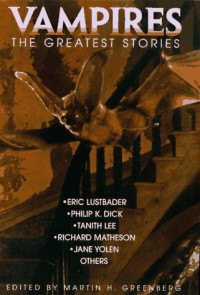Review


I'm well aware that putting "greatest stories" in the title is standard publisher's hype, but really, I'd hope that the contents would live up to that claim just a little better than this mostly-routine lot does. Starting with my least favorites, there was the painfully bad prose of "In Darkness, Angels" by Eric Lustbader; "The Bat Is My Brother" by Robert Bloch, which induced unintentional snickers by its grandiosity; and "Beyond All Measure" by Karl Edward Wagner, a standard piece which depended on the depiction of lesbianism as depravity for its effects. "Valentine from a Vampire", by Daniel Ransom, is a forgettable piece of silliness. S. P. Somtow goes into the futuristic-satire mode in "The Vampire of Mallworld", using vampirism as a symbol of messy human urges contrasted with sterile, glitzy, mediatized and plasticized culture; I suppose it may be a good story but this sort of thing always gets a shrug from me. On the better side, there was the mildly amusing perspective flip of Roger Zelazny's "Dayblood", and Richard Matheson's clever "No Such Thing as a Vampire" which, however, I don't think would repay rereading after you know the final twist. Dan Simmons's gruesome story of monstrosities lurking among the seemingly ordinary, "Shave and a Haircut, Two Bites", carefully controlled its tone and revelations but got a bit strained toward the end I thought. "Something Had to Be Done" by David Drake is a short Vietnam War story in the hard-bitten tone of this military sci-fi writer, not original but competent. Philip K. Dick's "The Cookie Lady" is another fright piece that makes a metaphor literal. Also "Red as Blood" by Tanith Lee, which uses Lee's usual extravagantly lush style to tell a version of Snow White with her as a vampire defeated by Christianity... A bravura piece of writing but I'm honestly not sure if it means much.
I greatly enjoyed "Child of an Ancient City" by Tad Williams -- it is not a new idea to use an Arabian Nights setting for a story about storytelling, and the language of it is of a familiar sort ("Some of the men again laughed loudly, but this time it rang false as a brass-seller's smile"); the conventions are very well used, however. This is a tale where a monster who has lost his humanity is turned aside by taking pity on the humanity of his victims, as revealed through nights of storytelling; a warm-hearted story. "The Man Who Loved the Vampire Lady", by Brian Stableford, is a very fine allohistorical story about the discovery of the origins of diseases and the effects that scientific discoveries may have on power relations. The pick of the anthology were Jane Yolen's heartwrenching "Mama Gone", and "The Miracle Mile" by Robert McCammon, a profoundly unease-provoking piece which is partly an elegiac lament for a lost world after a "biological incident" transforms much of humanity, while a man and his family walk among ruins, but the nature of the new world might be different if not seen through his eyes.
I greatly enjoyed "Child of an Ancient City" by Tad Williams -- it is not a new idea to use an Arabian Nights setting for a story about storytelling, and the language of it is of a familiar sort ("Some of the men again laughed loudly, but this time it rang false as a brass-seller's smile"); the conventions are very well used, however. This is a tale where a monster who has lost his humanity is turned aside by taking pity on the humanity of his victims, as revealed through nights of storytelling; a warm-hearted story. "The Man Who Loved the Vampire Lady", by Brian Stableford, is a very fine allohistorical story about the discovery of the origins of diseases and the effects that scientific discoveries may have on power relations. The pick of the anthology were Jane Yolen's heartwrenching "Mama Gone", and "The Miracle Mile" by Robert McCammon, a profoundly unease-provoking piece which is partly an elegiac lament for a lost world after a "biological incident" transforms much of humanity, while a man and his family walk among ruins, but the nature of the new world might be different if not seen through his eyes.










